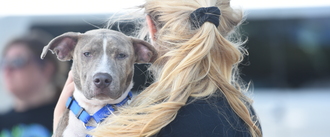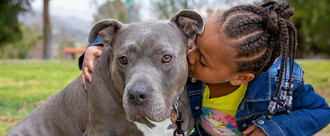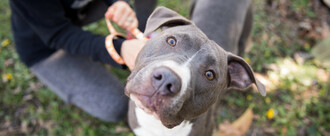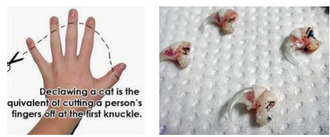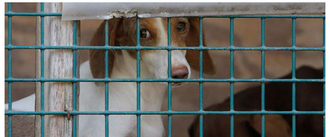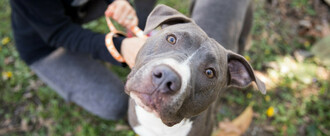-
Poner fin a las prácticas de seguros que restringen la raza en IllinoisHay una gran variedad de perros que entran en la categoría de razas "de riesgo" según algunas compañías de seguros, como los bóxers, los schnauzers gigantes, los pastores alemanes, los chows, los gran daneses, los malamutes de Alaska, los staffordshire terrier americanos, los akitas, los corsos de Caña, los bulldogs americanos, los malinois belgas, los keeshonds, los ridgebacks de Rodesia, los ovtcharkas, los huskies siberianos, los dobermans, los pitbulls, los dálmatas, los rottweilers y los perros boyeros australianos, entre otros. La Asociación Nacional de Comisarios de Seguros [NAIC] debería proteger a los consumidores propietarios de mascotas. Las compañías de seguros deberían centrarse en el comportamiento del perro. Los perros con comportamiento agresivo no deberían estar protegidos por ninguna moratoria. Esto es importante porque los perros son vistos por la gran mayoría de los estadounidenses como parte de la familia, y la capacidad de las personas para mantener las familias unidas debe ser protegida. Las prácticas de seguro restrictivas en materia de razas pueden obligar a los propietarios responsables de mascotas a renunciar a ellas y aumentar el número de mascotas en los refugios. La probabilidad de que un perro muerda se basa en muchos factores, como la socialización del perro, el adiestramiento de obediencia, la supervisión proporcionada por el propietario y la forma en que la víctima interactúa con el perro. No se ha demostrado científicamente que el comportamiento agresivo esté presente en ninguna raza de perro en particular. Las compañías de seguros que quieran reducir el riesgo deben centrarse únicamente en el comportamiento del perro y en la conducta del propietario.120 de 200 FirmasCreado por Caity K.
-
Poner fin a las prácticas de seguros que restringen la raza en ArizonaHay una gran variedad de perros que entran en la categoría de razas "de riesgo" según algunas compañías de seguros, como los bóxers, los schnauzers gigantes, los pastores alemanes, los chows, los gran daneses, los malamutes de Alaska, los staffordshire terrier americanos, los akitas, los corsos de Caña, los bulldogs americanos, los malinois belgas, los keeshonds, los ridgebacks de Rodesia, los ovtcharkas, los huskies siberianos, los dobermans, los pitbulls, los dálmatas, los rottweilers y los perros boyeros australianos, entre otros. La Asociación Nacional de Comisarios de Seguros [NAIC] debería proteger a los consumidores propietarios de mascotas. Las compañías de seguros deberían centrarse en el comportamiento del perro. Los perros con comportamiento agresivo no deberían estar protegidos por ninguna moratoria. Esto es importante porque los perros son vistos por la gran mayoría de los estadounidenses como parte de la familia, y la capacidad de las personas para mantener las familias unidas debe ser protegida. Las prácticas de seguro restrictivas en materia de razas pueden obligar a los propietarios responsables de mascotas a renunciar a ellas y aumentar el número de mascotas en los refugios. La probabilidad de que un perro muerda se basa en muchos factores, como la socialización del perro, el adiestramiento de obediencia, la supervisión proporcionada por el propietario y la forma en que la víctima interactúa con el perro. No se ha demostrado científicamente que el comportamiento agresivo esté presente en ninguna raza de perro en particular. Las compañías de seguros que quieran reducir el riesgo deben centrarse únicamente en el comportamiento del perro y en la conducta del propietario.101 de 200 FirmasCreado por Caity K.
-
Poner fin a las prácticas de seguros que restringen la raza en FloridaHay una gran variedad de perros que entran en la categoría de razas "de riesgo" según algunas compañías de seguros, como los bóxers, los schnauzers gigantes, los pastores alemanes, los chows, los gran daneses, los malamutes de Alaska, los staffordshire terrier americanos, los akitas, los corsos de Caña, los bulldogs americanos, los malinois belgas, los keeshonds, los ridgebacks de Rodesia, los ovtcharkas, los huskies siberianos, los dobermans, los pitbulls, los dálmatas, los rottweilers y los perros boyeros australianos, entre otros. La Asociación Nacional de Comisarios de Seguros [NAIC] debería proteger a los consumidores propietarios de mascotas. Las compañías de seguros deberían centrarse en el comportamiento del perro. Los perros con comportamiento agresivo no deberían estar protegidos por ninguna moratoria. Esto es importante porque los perros son vistos por la gran mayoría de los estadounidenses como parte de la familia, y la capacidad de las personas para mantener las familias unidas debe ser protegida. Las prácticas de seguro restrictivas en materia de razas pueden obligar a los propietarios responsables de mascotas a renunciar a ellas y aumentar el número de mascotas en los refugios. La probabilidad de que un perro muerda se basa en muchos factores, como la socialización del perro, el adiestramiento de obediencia, la supervisión proporcionada por el propietario y la forma en que la víctima interactúa con el perro. No se ha demostrado científicamente que el comportamiento agresivo esté presente en ninguna raza de perro en particular. Las compañías de seguros que quieran reducir el riesgo deben centrarse únicamente en el comportamiento del perro y en la conducta del propietario.144 de 200 FirmasCreado por Caity K.
-
Poner fin a las prácticas de seguros que restringen la raza en TexasHay una gran variedad de perros que entran en la categoría de razas "de riesgo" según algunas compañías de seguros, como los bóxers, los schnauzers gigantes, los pastores alemanes, los chows, los gran daneses, los malamutes de Alaska, los staffordshire terrier americanos, los akitas, los corsos de Caña, los bulldogs americanos, los malinois belgas, los keeshonds, los ridgebacks de Rodesia, los ovtcharkas, los huskies siberianos, los dobermans, los pitbulls, los dálmatas, los rottweilers y los perros boyeros australianos, entre otros. La Asociación Nacional de Comisarios de Seguros [NAIC] debería proteger a los consumidores propietarios de mascotas. Las compañías de seguros deberían centrarse en el comportamiento del perro. Los perros con comportamiento agresivo no deberían estar protegidos por ninguna moratoria. Esto es importante porque los perros son vistos por la gran mayoría de los estadounidenses como parte de la familia, y la capacidad de las personas para mantener las familias unidas debe ser protegida. Las prácticas de seguro restrictivas en materia de razas pueden obligar a los propietarios responsables de mascotas a renunciar a ellas y aumentar el número de mascotas en los refugios. La probabilidad de que un perro muerda se basa en muchos factores, como la socialización del perro, el adiestramiento de obediencia, la supervisión proporcionada por el propietario y la forma en que la víctima interactúa con el perro. No se ha demostrado científicamente que el comportamiento agresivo esté presente en ninguna raza de perro en particular. Las compañías de seguros que quieran reducir el riesgo deben centrarse únicamente en el comportamiento del perro y en la conducta del propietario.113 de 200 FirmasCreado por Caity K.
-
Poner fin a las prácticas de seguros que restringen la raza en CaliforniaHay una gran variedad de perros que entran en la categoría de razas "de riesgo" según algunas compañías de seguros, como los bóxers, los schnauzers gigantes, los pastores alemanes, los chows, los gran daneses, los malamutes de Alaska, los staffordshire terrier americanos, los akitas, los corsos de Caña, los bulldogs americanos, los malinois belgas, los keeshonds, los ridgebacks de Rodesia, los ovtcharkas, los huskies siberianos, los dobermans, los pitbulls, los dálmatas, los rottweilers y los perros boyeros australianos, entre otros. La Asociación Nacional de Comisarios de Seguros [NAIC] debería proteger a los consumidores propietarios de mascotas. Las compañías de seguros deberían centrarse en el comportamiento del perro. Los perros con comportamiento agresivo no deberían estar protegidos por ninguna moratoria. Esto es importante porque los perros son vistos por la gran mayoría de los estadounidenses como parte de la familia, y la capacidad de las personas para mantener las familias unidas debe ser protegida. Las prácticas de seguro restrictivas en materia de razas pueden obligar a los propietarios responsables de mascotas a renunciar a ellas y aumentar el número de mascotas en los refugios. La probabilidad de que un perro muerda se basa en muchos factores, como la socialización del perro, el adiestramiento de obediencia, la supervisión proporcionada por el propietario y la forma en que la víctima interactúa con el perro. No se ha demostrado científicamente que el comportamiento agresivo esté presente en ninguna raza de perro en particular. Las compañías de seguros que quieran reducir el riesgo deben centrarse únicamente en el comportamiento del perro y en la conducta del propietario.136 de 200 FirmasCreado por Caity K.
-
Ban the declawing of cats in Long Beach, CAPeople often mistakenly believe that declawing their cats is a harmless "quick fix" for unwanted scratching. They don't realize that declawing can make a cat less likely to use the litter box or more likely to bite. Declawing can also cause lasting physical problems and lead to the cat being surrendered to a shelter due to behavioral or health issues. Too often, people think that declawing is a simple surgery that removes a cat's nails—the equivalent of having your fingernails trimmed. Sadly, this is far from the truth. Declawing traditionally involves the amputation of the last bone of each toe. If performed on a human being, it would be like cutting off each finger at the last knuckle. The American Veterinary Medicine Association discourages declawing as an elective procedure and supports non-surgical alternatives. It is an unnecessary surgery that provides no medical benefit to the cat. Educated pet parents can easily train their cats to use their claws in a manner that allows everyone in the household to live together happily. In 2003, West Hollywood became the first city in the country to ban declawing. Since then, cities such as Berkeley, Beverly Hills, Burbank, Culver City, Los Angeles, San Francisco, and Santa Monica have joined them. New York has a statewide ban. Isn't it time for Long Beach to do the right thing for cats and ban declawing?255 de 300 FirmasCreado por Aostara K.
-
Prevent Puppy Mill Sales in KaysvilleMore than 400 other cities, counties and states have already passed laws to ban the retail sale of pets sourced from commercial breeding facilities. It's time for our community to do the same. Puppy and kitten mills are in business to supply pet stores. The pets in these facilities often spend their entire lives in dirty, crowded cages for the sole purpose of producing as many animals as possible for the retail pet trade. Pet stores that obtain animals from these facilities are not an asset to our city. These facilities also produce puppies that are often sick, causing unsuspecting consumers to have to care for a new pet in need of expensive veterinary treatment. Milled puppies can also spread campylobacter, a dangerous, drug-resistant bacteria that is contagious to humans. Recently, the Centers for Disease Control and Prevention (CDC) traced a multi-state outbreak of Campylobacter to pet store puppies. This is a public health risk in a time where public health should be a top priority. A retail pet sales ban will not prevent pet stores from doing business, but it will reduce the burden on our shelters and rescue groups by increasing pet adoptions. It will also benefit our local hobby breeders by allowing them to continue providing responsibly bred animals directly to those who cannot find what they are looking for through adoption. Please consider passing a humane pet store ordinance for our community.339 de 400 FirmasCreado por Amy M.

-
Save Cats in the BronxIn order to create compassionate no-kill communities and achieve no-kill for cats nationwide, we need communities to support lifesaving programs like Trap-Neuter-Return [TNR]. The process is simple: cats are caught (often by volunteers), evaluated by veterinarians, vaccinated, spayed or neutered, and returned to their original outdoor homes, unable to have kittens. These programs are also proven to be the most cost-effective, veterinarian-approved, and animal-friendly solution for controlling and reducing free-roaming cat populations.405 de 500 FirmasCreado por Briara M.
-
Saving Cats in Our CommunityIn order to create compassionate no-kill communities and achieve no-kill for cats nationwide, we need communities to support lifesaving programs like Trap-Neuter-Return [TNR]. The process is simple: cats are caught (often by volunteers), evaluated by veterinarians, vaccinated, spayed or neutered, and returned to their original outdoor homes, unable to have kittens. These programs are also proven to be the most cost-effective, veterinarian-approved, and animal-friendly solution for controlling and reducing free-roaming cat populations.203 de 300 FirmasCreado por Kim S.
-
End Breed-Restrictive Insurance Practices in CaliforniaThere is a wide range of dogs falling within the category of “risk” breeds according to some insurance companies including Boxers, Giant Schnauzers, German Shepherds, Chows, Great Danes, Alaskan Malamutes, American Staffordshire Terriers, Akitas, Cane Corsos, American Bulldogs, Belgian Malinois, Keeshonds, Rhodesian Ridgebacks, Ovtcharkas, Siberian Huskies, Dobermans, Pit Bulls, Dalmatians, Rottweilers, Australian Cattle dogs and more. The National Association of Insurance Commissioners [NAIC] should protect pet-owning consumers. Insurance companies should focus on the behavior of the dog. Dogs with aggressive behavior should not be protected by any moratorium. This is important because dogs are viewed by the vast majority of Americans as part of the family, and the ability for people to keep families together should be protected. Breed-restrictive insurance practices can force responsible pet owners to give up their pets and increase the number of pets in shelters. The likelihood a dog will bite is based on many factors such as socialization of the dog, obedience training, supervision provided by the owner, and how the victim interacts with the dog. It has not been proven by scientific evidence that aggressive behavior is present in any particular breed of dog. Insurance companies that want to reduce risk should focus solely on behavior of the dog and the behavior of the owner.2.784 de 3.000 FirmasCreado por Caity K.
-
End Breed-Restrictive Insurance Practices in FloridaThere is a wide range of dogs falling within the category of “risk” breeds according to some insurance companies including Boxers, Giant Schnauzers, German Shepherds, Chows, Great Danes, Alaskan Malamutes, American Staffordshire Terriers, Akitas, Cane Corsos, American Bulldogs, Belgian Malinois, Keeshonds, Rhodesian Ridgebacks, Ovtcharkas, Siberian Huskies, Dobermans, Pit Bulls, Dalmatians, Rottweilers, Australian Cattle dogs and more. The National Association of Insurance Commissioners [NAIC] should protect pet-owning consumers. Insurance companies should focus on the behavior of the dog. Dogs with aggressive behavior should not be protected by any moratorium. This is important because dogs are viewed by the vast majority of Americans as part of the family, and the ability for people to keep families together should be protected. Breed-restrictive insurance practices can force responsible pet owners to give up their pets and increase the number of pets in shelters. The likelihood a dog will bite is based on many factors such as socialization of the dog, obedience training, supervision provided by the owner, and how the victim interacts with the dog. It has not been proven by scientific evidence that aggressive behavior is present in any particular breed of dog. Insurance companies that want to reduce risk should focus solely on behavior of the dog and the behavior of the owner.2.195 de 3.000 Firmas
-
End Breed-Restrictive Insurance Practices in MontanaThere is a wide range of dogs falling within the category of “risk” breeds according to some insurance companies including Boxers, Giant Schnauzers, German Shepherds, Chows, Great Danes, Alaskan Malamutes, American Staffordshire Terriers, Akitas, Cane Corsos, American Bulldogs, Belgian Malinois, Keeshonds, Rhodesian Ridgebacks, Ovtcharkas, Siberian Huskies, Dobermans, Pit Bulls, Dalmatians, Rottweilers, Australian Cattle dogs and more. The National Association of Insurance Commissioners [NAIC] should protect pet-owning consumers. Insurance companies should focus on the behavior of the dog. Dogs with aggressive behavior should not be protected by any moratorium. This is important because dogs are viewed by the vast majority of Americans as part of the family, and the ability for people to keep families together should be protected. Breed-restrictive insurance practices can force responsible pet owners to give up their pets and increase the number of pets in shelters. The likelihood a dog will bite is based on many factors such as socialization of the dog, obedience training, supervision provided by the owner, and how the victim interacts with the dog. It has not been proven by scientific evidence that aggressive behavior is present in any particular breed of dog. Insurance companies that want to reduce risk should focus solely on behavior of the dog and the behavior of the owner.156 de 200 Firmas

